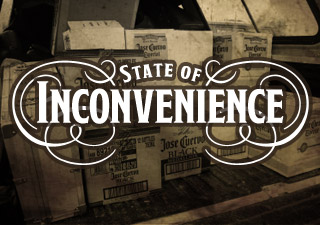Commentary

The State of Inconvenience
Walk into any supermarket in Ohio and you can see shoppers purchasing everything they need for dinner – including the wine to go with it. In West Virginia, residents can fill up their gas tank and replenish their wine selection in one stop. In fact, every state except Utah provides more freedom over wine and spirits sales than Pennsylvania. This lack of liquor liberty has turned average residents into bootleggers.
A 2011 Pennsylvania Liquor Control Board-commissioned survey, conducted within Berks, Bucks, Chester, Delaware, Lehigh, Montgomery, Northampton, and Philadelphia counties, revealed that 45 percent of consumers purchase some or all of their alcohol outside of the commonwealth, even though it is illegal to transport it back into the state. Based on PLCB sales in these eight counties alone, out-of-state purchases represented $180 million in lost sales and more than $40 million in tax revenue lost annually to bordering states.
It should come as no surprise that residents in Pennsylvania prefer choosing a brand for themselves or shopping at privately-operated stores in other states. When the Commonwealth Foundation compared prices for the best selling wine and spirits products in Pennsylvania and in each of its bordering states, average prices for wine were lower in all six border states. Wine prices in Maryland were an astounding 20 percent cheaper than in Pennsylvania’s stores. Prices for liquor were more divided, with average liquor prices in Pennsylvania lower than West Virginia, New Jersey, and New York and higher than Ohio, Delaware, and Maryland.
Perhaps a greater factor than price in Pennsylvanians’ dissatisfaction is the inconvenience. There are fewer than 650 liquor stores across the entire commonwealth. That comes out to nearly 20,000 residents per store, more than four times the national average. Consider the dilemma of Adams County, Pa. residents. They can shop at the lone PLCB store serving the entire county, or drive south and choose from five liquor stores within five miles across the Maryland border.
Some suggest proliferation of private stores will endanger Pennsylvania residents. Yet, if having full government control over wine and spirits sales results in better safety, the Keystone State should have America’s lowest numbers in alcohol-related traffic deaths and excessive drinking. Instead, the commonwealth has more alcohol-related traffic fatalities than four of the six border states. Mothers Against Drunk Driving ranks Pennsylvania 30th in DUI safety, worse than all bordering states but Delaware. Additionally, a survey by the U.S. Department of Health and Human Services ranks Pennsylvania higher than the national average in underage drinking, binge drinking, and underage binge drinking.
Indeed, the PLCB operates with a contradictory mission: It is both the state’s alcohol watchdog and it advertises and encourages liquor sales at its stores. The PLCB spends more than $10 million a year on advertising and marketing. In the last two years, the PLCB has spent nearly $1 million so that Philadelphia Eagles fans could see their ads at Lincoln Financial Field. They spent millions more on a “rebranding” consultant, resulting in changing the names of some state stores from “Wine and Spirits” to “Fine Wine and Good Spirits,” all to lure more customers to a system incapable of meeting consumer needs.
Furthermore, a double standard exists in liquor control enforcement between bars and state-run liquor stores. State police regularly perform sting operations on bars and restaurants to catch wait staff or bartenders selling alcohol to underage teens. However, these same compliance checks are not carried out in state-run liquor stores. Why? Because the PLCB is allowed to police its own operations. This clear conflict of interest between encouraging and controlling sales would be eliminated if the state got out of the booze business and instead focused on the enforcement of laws to protect citizens from underage drinking, binge drinking and other forms of alcohol abuse.
Making liquor shopping inconvenient isn’t making Pennsylvania any safer or products any more affordable. Allowing the state to concentrate on its enforcement role and private businesses to sell wine and spirits in a competitive market will give Pennsylvanians the freedom, convenience and pricing they deserve. It’s well past closing time for the government-run monopoly over liquor stores in Pennsylvania.
# # #
James Miller is a Research Fellow and Katrina Currie is a Policy Analyst with the Commonwealth Foundation (www.CommonwealthFoundation.org), Pennsylvania’s free-market think tank that crafts free market policies, convinces Pennsylvanians of their benefits and counters attacks on liberty.